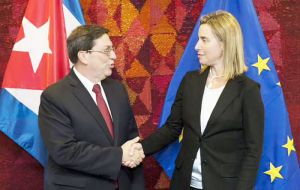MercoPress. South Atlantic News Agency
Cuba, Europe normalize relations after 20 years
 Federica Mogherini and Cuban Foreign Minister Bruno Rodríguez signed an agreement to restore relations between the island and Europe.
Federica Mogherini and Cuban Foreign Minister Bruno Rodríguez signed an agreement to restore relations between the island and Europe. Cuba and the Eurpean Union Monday signed in Brussels their first cooperation agreement, which will be from now on the legal basis of the link between the island and the 28 EU countries.
European diplomat Federica Mogherini and Cuban Foreign Minister Bruno Rodríguez signed an agreement ending 20 years of European blockade launched in 1996 at the behest of the Spanish government of then-President Jose Maria Aznar. Cuba thus ceases to be an anomaly in European relations with the countries of Latin America. The so-called 'Agreement on Political Dialogue and Cooperation,' which will be the legal basis from now on relations between Cuba and the 28 countries of the EU .
Mogherini said that “Cuba is changing profoundly. The European Union is accompanying this process jointly with the Cuban government. With the agreement, we will have the opportunity to bring the relationship between the European Union and Cuba to a new level.”
Rodríguez Parrilla acknowledged that the relationship “went through moments of disagreement” and that the elimination of the 'common position' “reestablishes normalization between the EU and Cuba.”
“For the Cuban economy, the relationship with Europe is a priority,” the foreign minister said, but he recalled that the US blockade, mainly due to financial restrictions, “remains an obstacle in the economic relationship between European countries and Cuba.”
The European “chancellor” made a veiled reference to the change in Washington: “We both know well that the international environment presents challenges today and our partnership will be even more important than it has been so far.” Rodríguez Parrilla was clearer: “relations between Cuba and Europe happily do not pass through Washington”.
The agreement, according to the European Commission, “will facilitate and strengthen political dialogue, improve bilateral cooperation and development.” Europe thus tries to maintain its influence in a Cuba that can change faster after the death of Fidel Castro and the probable hardening of Washington after the election of Donald Trump.
Brussels says the agreement will help the EU “support the transition process of the Cuban economy and society” and includes “dialogue on sustainable development, democracy and human rights”. It also includes sections on trade and trade cooperation.
The agreement annuls in practice the 'common position', which required the Cuban regime to make democratic progress to improve the relationship. The EU does not apply this hard-line policy to other dictatorships. The death of Fidel Castro serves as a change of stage but the agreement signed on Monday was negotiated since Mogherini's visit to Havana last March.
Europe broke relations with the Cuban regime in 1996 after the first conservative government came to power in Madrid since the establishment of democracy. The EU then assured that there would be no improvement in relations with Cuba until the island took clear steps towards democratization. Havana considered that this position was an interference that prevented normalization of relations.
Diplomatic sanctions came in 2003 with the so-called 'Black Spring' and the imprisonment of dissidents. In the following years, the European Parliament handed over its Sakharov Prize to freedom of conscience to dissidents such as Oswaldo Payá, Guillermo Fariñas or the organization of the Damas de Blanco. Visits to the island were kept to a minimum.
The change in Madrid with the arrival in 2004 of the government of the socialist Rodríguez Zapatero began to provoke the turn. In 2008 dialogue resumed and European cooperation returned to Cuba. The sanctions were lifted and a cautious dialogue began in 2010.
In 2012 the then European 'chancellor' Catherine Ashton began to feel how she could improve the relationship with Cuba without disturbing the European capitals who wanted to keep the hand hard, especially the Eastern European countries that went through communist dictatorships and partly the Nordic countries and Germany.
The Czechs were for years the great stumbling block. One government after another recalled that in 1968 Fidel Castro applauded when Soviet tanks crushed the 'Prague Spring' that ended the second attempt at democratic rebellion after Budapest in 1956. Castro then said that the rebels were counterrevolutionaries who took Czechoslovakia to capitalism and to the arms of the imperialists. Their leaders called them “reactionary fascists.” According to data from the European Bureau of Statistics, the EU is Cuba's second largest trading partner after Venezuela with more than 2.7 billion euros in trade in 2015.




Top Comments
Disclaimer & comment rulesCommenting for this story is now closed.
If you have a Facebook account, become a fan and comment on our Facebook Page!